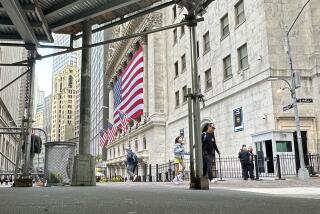FINANCIAL MARKETS : Bond Prices Rise in Wake of Dollar Rally
NEW YORK — The credit market resumed its recent rally amid rising optimism about the Federal Reserve Board’s monetary policy.
Bond prices took a cue from the dollar, which staged a comeback from a drop on news that West Germany and several other European countries were raising their principal lending rates.
Soon after the news from Europe, the dollar took a tumble but bobbed back up to finish higher for the day. Bond traders took heart from the dollar’s resilience, said Robert Brusca, chief economist at Nikko Securities International.
The dollar’s strength has been a key force behind the bond market’s advance in recent weeks. Increasing value in the dollar tends to draw money into dollar-denominated holdings such as Treasury bonds.
By the end of trading, the 30-year U.S. Treasury bond sported a gain of 3/8 point, or $3.75 per $1,000 in face value. The yield on the key bond, which moves in the opposite direction to price, declined to 8.09% from 8.13% late Wednesday.
In the secondary market for Treasury securities, prices of short-term government issues rose by 3/16 point to 9/32 point, intermediate maturities increased 1/4 point to 3/8 point and long-term issues were up 3/8 point to 13/32 point, according to Telerate Inc., a financial information service.
The movement of a point is equivalent to a change of $10 in the price of a bond with a $1,000 face value.
In the tax-exempt market, the Bond Buyer index of 40 actively traded municipal bonds rose 1/8 point. The average yield to maturity edged down to 7.31% from 7.32%.
Yields on three-month Treasury bills fell to 8.24% as the discount slid 7 basis points to 7.97%. Yields on six-month bills declined to 8.17% as the discount shed 4 basis points to 7.75%.
The federal funds rate, the interest on overnight loans between banks, was quoted late in the day at 9.688%, up from Wednesday’s 9.563%.
Currency
The dollar staged a puzzling turnaround when it finished mostly higher in domestic trading despite announcements that a string of European central banks will hike key lending rates.
Gold prices were mixed. Republic National Bank of New York quoted an ounce of gold at $370.15 as of 4 p.m. EDT, down from $374.40 late Wednesday.
The dollar began to tumble after West Germany’s Bundesbank announced it would hike its discount and Lombard rates by half a percentage point each, effective today.
Similar actions followed in France, Switzerland, Belgium, the Netherlands, Denmark and Austria.
Higher rates overseas typically depress the dollar by enhancing the value of foreign investments. Rather than purchase dollars to invest in U.S. securities, foreign investors will keep their funds overseas when rates there are attractive.
Following the central banks’ announcements, the dollar fell a steep 2.3 pfennigs to 1.9390 West German marks. But before trading ended in Europe and midway through the domestic session, the dollar began to turn around, a phenomenon that had many traders scratching their heads.
Some said the recovery was due to a variety of technical factors, including the fact that traders already had begun to square up their positions ahead of the July 4th holiday weekend.
But Robert Ryan, a vice president at Irving Trust Co., noted that heavy Japanese dollar-buying in the face of political difficulties in Tokyo worked to boost the U.S. currency.
In Tokyo, the dollar slipped to 142.90 Japanese yen from 143.55 on Wednesday. Later in London, the U.S. currency traded lower at 142.53. In New York, however, the dollar climbed to 144.00 yen from 143.25 yen on Wednesday.
In London, one British pound cost $1.5650, more expensive for buyers than Wednesday’s late $1.5613. Later in New York, it cost $1.5435 to buy one pound, cheaper than $1.5580 on Wednesday.
Commodities
Futures prices of silver, gold and platinum fell sharply amid growing fears that the U.S. economy is sliding inexorably into a recession.
On other markets, coffee futures sank; energy futures climbed; grains and soybeans were mostly lower, and livestock and meat futures were mixed.
On New York’s Commodity Exchange, gold settled $5.30 to $6.20 lower, with the contract for delivery in August at $373.90 an ounce; silver was 16.5 cents to 19.8 cents lower, with July at $5.12 an ounce.
Platinum was $4.40 to $6.70 lower on the New York Mercantile Exchange, with July slipping below the psychologically important $500 level to settle at $496.90 an ounce.
Tables begin on Page 6
More to Read
Inside the business of entertainment
The Wide Shot brings you news, analysis and insights on everything from streaming wars to production — and what it all means for the future.
You may occasionally receive promotional content from the Los Angeles Times.










